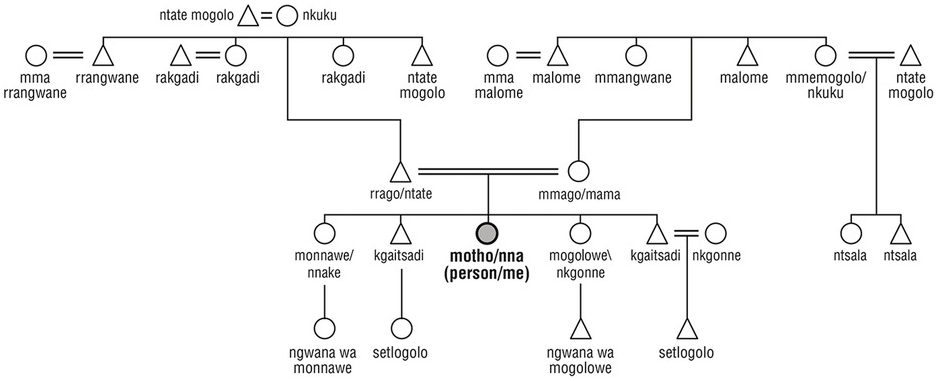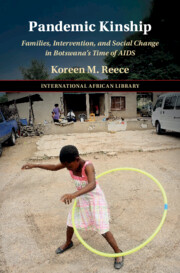Note on Pronunciation
Setswana is pronounced much as it is written, with a few key exceptions (Matumo Reference Matumo1993):
‘e’ may be pronounced either as ey in the English they, e.g. malome; or as e in then, e.g. akere
‘g’ is pronounced like ch in loch, e.g. gae
‘i’ is pronounced ee as in deep, e.g. masimo
‘kg’ is pronounced as a guttural k, e.g. kgotla; dikgang is therefore di-KHang
‘ng’ is pronounced like ng in sing, e.g. ngaka
‘o’ is pronounced like oa in boat, e.g. motse
‘th’ is pronounced as an aspirated t as in take, e.g. motho
Glossary
- (go) aga
to build
- akere
right?; isn’t it?
- Ao!
expression of surprise (interjection)
- bagolo
elders
- balwapeng
family (lit. people of the courtyard)
- bana ba bommaboipelego
children of the social worker (often used for orphans)
- bana ba motho
siblings (lit. children of a person)
- banyana
girls
- batsadi
see motsadi
- Batswana
Tswana people
- bogadi
bridewealth (see also lobola)
- botho
personhood; connotes dignity, respectfulness, and humane behaviour
- dikgang
see kgang
- ee
yes
- gae
home or home village
- gareitse (gakeitse)
we don’t know (I don’t know)
- hei! / haish! / heela!
hey!; expressions of surprise, insistence, or fatigue (interjections)
- ija! / ijo!
expressions of surprise, annoyance, or sympathy (interjections)
- isong
fireplace, hearth, or outdoor kitchen
- (go) itirela
to make or do for oneself; to make oneself as a social person
- kagisanyo
harmony
- kagiso
peace
- kana
actually, as it happens (interjection)
- kgang (pl. dikgang)
issue or problem; topic of discussion, argument, or earnest debate; a disputed question or contention; also news
- kgaoganya
to share out, separate, or resolve
- kgokgontsho ya bana
child abuse
- kgosi
chief
- kgosikgolo
paramount chief
- kgotla
customary court or tribal administration
- ko gae
at home (referring to one’s natal home or home village)
- ko lwapeng
in the courtyard or at home (i.e. the yard one stays in)
- kwa ga …
at the place of
- lefufa
jealousy
- lelwapa (pl. malwapa)
courtyard; house; family
- lobola
bridewealth (see also bogadi)
- lorato
love
- malome (pl. bomalome)
uncle (specifically, mother’s brother)
- malwapa
see lelwapa
- masimo
farmlands
- medumo (sing. modumo)
noise; disturbances
- mmago/mmagwe
mother of
- mma malome
uncle’s wife; female uncle
- monna
man or husband
- monna wa me
my man or my husband
- mophato (pl. mephato)
age regiment
- morafe (pl. merafe)
tribal polity; nation
- moraka
cattle post
- mosadi (pl. basadi)
woman
- motsadi (pl. batsadi)
parent
- motse
village
- motsetse
confinement
- motshelo (pl. metshelo)
savings group
- Motswana
Tswana person (singular)
- mpona!
look at me!
- mxm!
expression of annoyance, frustration, or derision (interjection)
- ngaka
traditional doctor
- ngwana
child
- nkuku
grandmother
- nna
me or I
- nnyaa
no
- puo
conversation or discussion (of difficult matters); a case to be tried
- rrago/rragwe
father of
- seabe
a portion given; a share
- segotlo
backyard
- seswaa
stewed and shredded meat, common at weddings and funerals
- Setswana
the language and culture of the Tswana
- sjambok
a rubberised whip (Afrikaans)
- sotlega
scorn
- tirisanyo mmogo
cooperation; working together
- tlakwano
come here
- tlhokomelo
care
- (go) tsamaya
to go
- wena
you
Kin Terms
Kin terms in Setswana are complex, fluid, and sometimes interchangeable, and they do not translate readily into English. They distinguish on the basis of relative age and relative sex, and there are different terms used to identify relationships in the third (his/her), second (your), and first (my) person. Here, I have distinguished them by generation for ease of reference, although roles and terms frequently move between and across generations (Figure 12).

Figure 12 Tswana kin terms.




